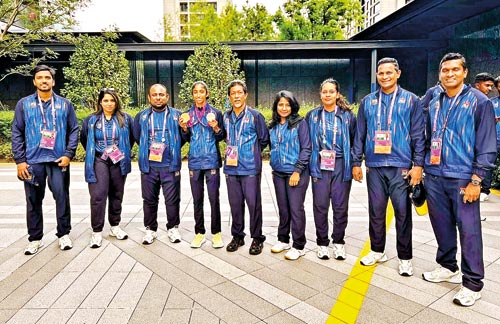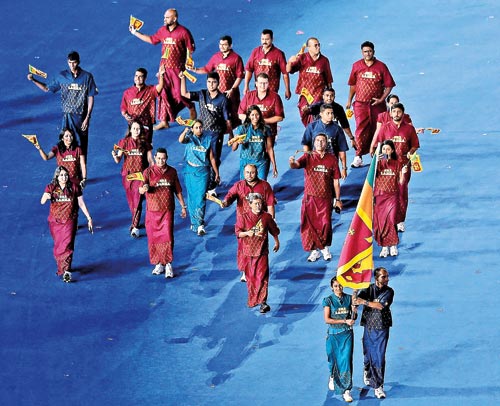Sri Lanka should adopt ‘sports science’ culture – Nishanthe Piyasena

Chef de Mission Nishanthe Piyasena (C) and Prof. Chathuranga Ranasinghe (R) with the medical support team and gold medalist Tharushi Karunaratne at the Asian Games in Hangzhou
Sri Lanka should adopt the culture of ‘sports science’ if its athletes are to compete on par with their international counterparts, highlighted Nishanthe Piyasena, the Chef de Mission of the country’s 19th Asian Games contingent.
Identifying sports injuries and placing a proper plan to have athletes fully fit and recovered for major international events became a subject of interest with cricket taking centre stage after the recent accusations connected to corruption and mismanagement by the Sri Lanka Cricket (SLC) administrators, the issue has now reached the core phase of the chain.
Other than the facts and allegations brought up against those who are in-charge of running the day-to-day affairs of cricket, the general interest has shifted to the manner the national cricket team’s underperforming display, and the level of fitness of its players.
Sri Lanka became the only team to replace as many as six players during the whole of the tournament, due to injuries, including the appointed captain. Criticism has been at large, after the cricket debacle became a national issue, with many pointing fingers towards the team officials and selectors for failing to field a ‘proper’ and ‘fit’ team for a world event that comes every quadrennial.
Though SLC has a separate medical and fitness unit, it clearly served less or no purpose during Sri Lanka’s disastrous World Cup campaign, second only to the edition of 1999. To address this issue, Piyasena, said the country should emphatically move towards a ‘sports science’ culture.
Piyasena, also the President of the Lanka Modern Pentathlon Federation of Sri Lanka, revealed to the Sunday Times that the country reaped the benefits of what can be termed a ‘comprehensive’ preparation protocol ahead of the Hangzhou Games.
“I have been involved with the National Olympic Committee of Sri Lanka (NOC) for many years, and I should say that the recent Asian Games, at which I served as Chef de Mission, was one of the best in terms of fitness and injury prevention,” Piyasena asserted.

Piyasena leading the Sri Lanka team
After Sri Lanka was left with a mere 90 days prior to the Asian Games, the local authorities set up a medical unit which included Prof. Chathuranga Ranasinghe and Dr. Chathura Edirisinghe. The NOC, who held the responsibility of liaising between the local sports associations and athletes, and the organisers in China, introduced a 60-day preparation protocol covering all 96 athletes who represented the country.
“Prof. Chathuranga Ranasinghe and Dr. Chathura Edirisinghe did a fantastic job with the athletes during the said 60 days. We had ample time to talk with each athlete personally and examine them, to identify their injuries and physical woes and correct them with perfection. By far it was the best multi-sport event that Sri Lanka took part with minimal injuries,” he explained.
“I was approached by the NOC six months prior to the Asian Games, through its medical unit. My specialised background is sports and exercise medicine, and we followed a simple yet comprehensive planning protocol of 60 days. We focused on all areas such as injuries, recovery, nutrition, physiotherapy and performance enhancement. We also had the assistance from other government sectors as well as specialised consultants,” elaborated Prof. Ranasinghe, who admired the voluntary services provided by consultants Prof. Ranil Jayawardene, Dr. Chamara Weerasinghe, Dr. Chathuri Suraweera and Dr. Iresh Jayaweera.
Following their Asian Games campaign, where Sri Lanka secured a gold and two each of silver and bronze medals, Piyasena suggested that all sports associations and federations of the country, including cricket, should utilize the services of what could be the future of the country’s future in sports.
Sri Lanka’s Ministry of Sports has a separate division dedicated to treat its national athletes through the Department of Sports Science, but according to Piyasena’s observations national associations hardly tend to seek its services.
“There should be a national policy when it comes to treating (player) injuries. The NOC set a trend that could become a national programme, if the relevant authorities treat it as a matter of national interest. It could benefit any sports association or federation in the long run, if properly set up and utlised,” he said.
Currently, Sri Lanka is well equipped with the necessary expertise and medical equipment, however sidelined without being made use of. Piyasena was resolute that Sri Lanka, as a country, could benefit its athletes to become contenders on par with international standards physically and mentally, if sports science is given the proper spotlight.


